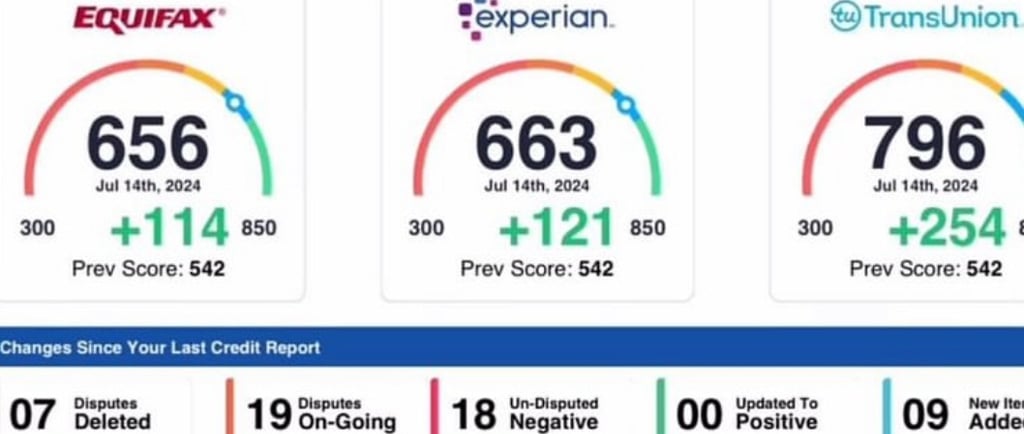Understanding Credit & Credit Repair
What is Negative Credit
UNDERSTANDING CREDIT SCORECREDIT REPAIREXPERIAN


Title: Decoding Your Credit Report: A Guide to Negative Credit Items, Their Impact, and Effective Credit Repair
Your credit report is a detailed record of your financial history, and unfortunately, it can contain negative credit items that significantly impact your credit score. Understanding these negative marks is the first step towards taking control of your credit health. In this post, we'll break down common negative items, their impact, and how Ten Dollar Credit Repair can help you navigate the credit repair process.
Get Your Free Credit Reports:
You can obtain free copies of your credit reports from all three major credit bureaus by visiting the official AnnualCreditReport.com website:
The Negative Item Menu: A Comprehensive Overview
Here's a breakdown of the negative items you might find on your credit report:
Late or Missed Payments:
Description: These indicate that you failed to make payments on time for credit accounts like credit cards, loans, or utility bills.
Impact: Payment history is the most significant factor in your credit score. Even one late payment can lower your credit score, and multiple late payments have a severe impact on your creditworthiness.
Reporting Time: Generally, 7 years from the date of the late payment.
Collections:
Description: This occurs when a creditor sells your unpaid debt to a collection agency.
Impact: Collections are a major red flag to lenders, signaling a high risk of default. They can significantly lower your credit score and make it difficult to obtain credit.
Reporting Time: Generally, 7 years from the original delinquency date.
Charge-Offs:
Description: A charge-off is when a creditor writes off a debt as a loss because you haven't paid it. You still owe the debt, even though the creditor has written it off.
Impact: Charge-offs are viewed very negatively by lenders and can severely damage your credit score, making it harder to get approved for loans.
Reporting Time: Generally, 7 years from the original delinquency date.
Judgments:
Description: This is a court order requiring you to pay a debt.
Impact: Judgments indicate a legal action taken against you for unpaid debt and can substantially lower your credit score, affecting your ability to secure credit.
Reporting Time: Varies by state, but generally up to 7 years from the filing date.
Tax Liens:
Description: A tax lien is a legal claim by the government against your property for unpaid taxes.
Impact: Tax liens can severely damage your credit score and make it difficult to obtain credit, including mortgages and loans.
Reporting Time:
Paid tax liens: 7 years from the date of payment.
Unpaid tax liens: Can remain indefinitely in some cases.
Repossessions:
Description: This occurs when a lender takes back property (usually a vehicle) because you failed to make loan payments.
Impact: Repossessions are a major negative mark and can significantly lower your credit score, making it challenging to get approved for future auto loans.
Reporting Time: Generally, 7 years from the original delinquency date.
Foreclosure:
Description: This is the legal process by which a lender takes ownership of a property because you failed to make mortgage payments.
Impact: Foreclosures are one of the most severe negative items and can drastically lower your credit score, impacting your ability to secure future home loans.
Reporting Time: Generally, 7 years from the completion date.
Bankruptcy:
Chapter 7 Bankruptcy: This involves the liquidation of assets to pay off debts.
Reporting Time: 10 years from the filing date.
Chapter 13 Bankruptcy: This involves a repayment plan.
Reporting Time: 7 years from the filing date.
Hard Inquiries:
Description: These occur when a lender checks your credit report in response to a credit application.
Impact: A few hard inquiries have a minimal impact, but too many in a short period can lower your credit score, making it appear you are seeking too much credit.
Reporting Time: Generally, 2 years.
Contacting the Major Credit Bureaus
Here's the contact information for the major credit bureaus, which you may need for various credit repair activities:
Equifax
Website: www.equifax.com
Mailing Address: Equifax Information Services LLC, P.O. Box 740256, Atlanta, GA 30374
Experian
Website: www.experian.com
Mailing Address: Experian, P.O. Box 4500, Allen, TX 75013
TransUnion
Website: www.transunion.com
Mailing Address: TransUnion LLC, Consumer Dispute Center, P.O. Box 2000, Chester, PA 19016
How Ten Dollar Credit Repair Can Help
Ten Dollar Credit Repair provides you with the tools and credit repair knowledge to challenge inaccurate or unverifiable negative credit items on your credit report. Our eBook offers proven credit repair strategies to:
Understand your credit rights under the Fair Credit Reporting Act (FCRA).
Identify errors and discrepancies on your credit report.
Craft effective dispute letters to credit bureaus and creditors.
Negotiate with creditors to resolve outstanding debts.
By taking control of your credit and actively addressing negative items, you can improve your credit score and open doors to better financial opportunities.
(Continue to expand on each negative item and the credit repair strategies in more detail.)
rewrite also provide the phone number to each credit bureau
Brainstormer
Okay, here's the revised blog post with phone numbers added for each credit bureau:
Title: Decoding Your Credit Report: A Guide to Negative Credit Items, Their Impact, and Effective Credit Repair
Your credit report is a detailed record of your financial history, and unfortunately, it can contain negative credit items that significantly impact your credit score. Understanding these negative marks is the first step towards taking control of your credit health. In this post, we'll break down common negative items, their impact, and how Ten Dollar Credit Repair can help you navigate the credit repair process.
Get Your Free Credit Reports:
You can obtain free copies of your credit reports from all three major credit bureaus by visiting the official AnnualCreditReport.com website:
The Negative Item Menu: A Comprehensive Overview
Here's a breakdown of the negative items you might find on your credit report:
Late or Missed Payments:
Description: These indicate that you failed to make payments on time for credit accounts like credit cards, loans, or utility bills.
Impact: Payment history is the most significant factor in your credit score. Even one late payment can lower your credit score, and multiple late payments have a severe impact on your creditworthiness.
Reporting Time: Generally, 7 years from the date of the late payment.
Collections:
Description: This occurs when a creditor sells your unpaid debt to a collection agency.
Impact: Collections are a major red flag to lenders, signaling a high risk of default. They can significantly lower your credit score and make it difficult to obtain credit.
Reporting Time: Generally, 7 years from the original delinquency date.
Charge-Offs:
Description: A charge-off is when a creditor writes off a debt as a loss because you haven't paid it. You still owe the debt, even though the creditor has written it off.
Impact: Charge-offs are viewed very negatively by lenders and can severely damage your credit score, making it harder to get approved for loans.
Reporting Time: Generally, 7 years from the original delinquency date.
Judgments:
Description: This is a court order requiring you to pay a debt.
Impact: Judgments indicate a legal action taken against you for unpaid debt and can substantially lower your credit score, affecting your ability to secure credit.
Reporting Time: Varies by state, but generally up to 7 years from the filing date.
Tax Liens:
Description: A tax lien is a legal claim by the government against your property for unpaid taxes.
Impact: Tax liens can severely damage your credit score and make it difficult to obtain credit, including mortgages and loans.
Reporting Time:
Paid tax liens: 7 years from the date of payment.
Unpaid tax liens: Can remain indefinitely in some cases.
Repossessions:
Description: This occurs when a lender takes back property (usually a vehicle) because you failed to make loan payments.
Impact: Repossessions are a major negative mark and can significantly lower your credit score, making it challenging to get approved for future auto loans.
Reporting Time: Generally, 7 years from the original delinquency date.
Foreclosure:
Description: This is the legal process by which a lender takes ownership of a property because you failed to make mortgage payments.
Impact: Foreclosures are one of the most severe negative items and can drastically lower your credit score, impacting your ability to secure future home loans.
Reporting Time: Generally, 7 years from the completion date.
Bankruptcy:
Chapter 7 Bankruptcy: This involves the liquidation of assets to pay off debts.
Reporting Time: 10 years from the filing date.
Chapter 13 Bankruptcy: This involves a repayment plan.
Reporting Time: 7 years from the filing date.
Hard Inquiries:
Description: These occur when a lender checks your credit report in response to a credit application.
Impact: A few hard inquiries have a minimal impact, but too many in a short period can lower your credit score, making it appear you are seeking too much credit.
Reporting Time: Generally, 2 years.
Contacting the Major Credit Bureaus
Here's the contact information for the major credit bureaus, which you may need for various credit repair activities:
Equifax
Website: www.equifax.com
Phone Number: 1-888-EQUIFAX (1-888-378-4329)
Mailing Address: Equifax Information Services LLC, P.O. Box 740256, Atlanta, GA 30374
Experian
Website: www.experian.com
Phone Number: 1-888-EXPERIAN (1-888-397-3742)
Mailing Address: Experian, P.O. Box 4500, Allen, TX 75013
TransUnion
Website: www.transunion.com
Phone Number: 1-800-916-8800
Mailing Address: TransUnion LLC, Consumer Dispute Center, P.O. Box 2000, Chester, PA 19016
How Ten Dollar Credit Repair Can Help
Ten Dollar Credit Repair provides you with the tools and credit repair knowledge to challenge inaccurate or unverifiable negative credit items on your credit report. Our eBook offers proven credit repair strategies to:
Understand your credit rights under the Fair Credit Reporting Act (FCRA).
Identify errors and discrepancies on your credit report.
Craft effective dispute letters to credit bureaus and creditors.
Negotiate with creditors to resolve outstanding debts.
By taking control of your credit and actively addressing negative items, you can improve your credit score and open doors to better financial opportunities. We recommend you know what your FICO score is before you start! We recommend MyScoreIQ: Click the link to find out what your TRUE FICO Score is: https://www.myscoreiq.com/get-fico-max.aspx?offercode=43214048
